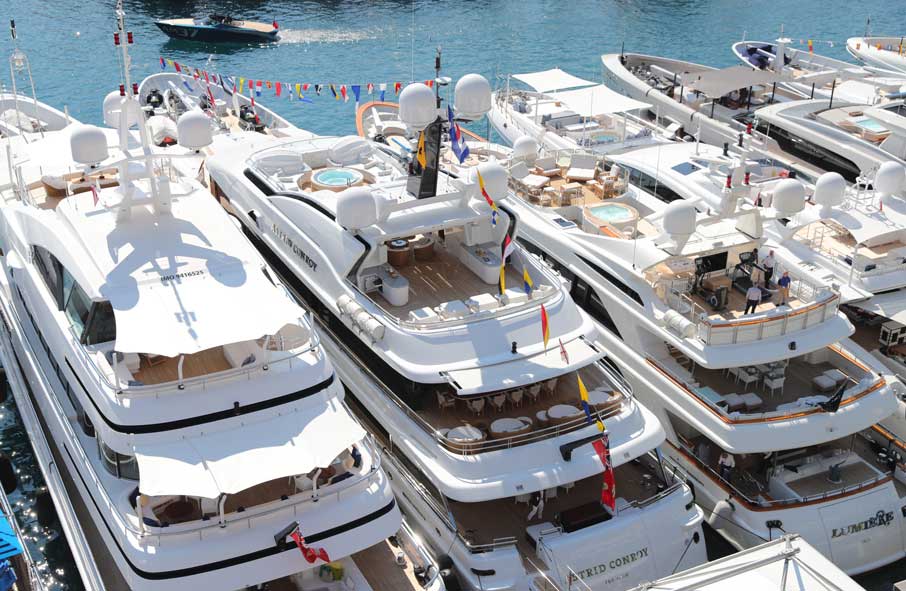Working on a Superyacht - A Complete Guide
- Authors
-
-

- Name
- Patrick Maflin
-

Working on a superyacht is an exciting prospect if you’re trying to find a job which offers something very different from your typical 9 to 5 grind.
There are numerous roles you may wish to consider on board a superyacht.
What you choose will depend on your personality, interests, skills and background.
In this complete guide to working on a superyacht we hope that you will gain a better understanding of how to best go about getting a job aboard a superyacht, to hopefully embark on the career of your dreams at sea.
Chapters
- What is a Superyacht?
- What Does Working on a Superyacht Have to Offer?
- What is the Work Ethic Like?
- What are the Job Roles Aboard a Superyacht?
- How Much are Yacht Crew Paid?
- What Skills & Experience are Required?
- Do I Need Any Qualifications?
- How Do I Find a Superyacht Job?
- When are the Yachting Seasons?
- Conclusion
What is a Superyacht?
A superyacht is the term used to describe any leisure yacht which is over 24 metres in length.
Nowadays the superyacht industry has become a very popular and lucrative one.
Many people are considering taking up a job on board a superyacht, especially since the hit reality TV series Below Deck gained worldwide popularity.
What Does Working on a Superyacht Have to Offer?
 Yacht crew serving guests. Image credit: Shutterstock
Yacht crew serving guests. Image credit: ShutterstockNowadays there are several superyachts sailing the seas, including motor and sail.
Between them, thousands of crew members are employed to ensure the superyacht is kept in top shape and that the owners and any guests on board are served to the highest standards.
Working within the superyacht industry can prove to be a very rewarding and enticing career for the right types of personality.
It’s certainly a different kind of career than most other traditional jobs.
There’s always a great deal going on on board, and travel and adventure will be an integral part of your life.
As most yachts head to the Mediterranean in the summer months, and the Caribbean in the winter, you will get to experience the sunniest places at the best times of the year.
Moreover, yacht crew are very well paid.
Salaries will vary considerably from one yacht to another, depending on its size and type.
It’s important however to bear in mind that working on a superyacht also means having to work long hours.
But the end result can be rewarding, especially if you spent over 183 days at sea.
This essentially means any income earned should qualify for the seafarers earning deduction, which means you pay zero income tax!
What is the Work Ethic Like?
A traditional job will often have a set start and end time every day.
You head off home after a long day, and see your family and unwind for the rest of the evening.
This is certainly not the case with a job in the superyacht industry.
At the end of a long day, you will most likely spend the evening having dinner with the rest of the crew.
And you will generally share a cabin with another crew member, so essentially, you live and work in one place around the clock.
It’s therefore important to keep this in mind, along with your openness to this kind of lifestyle.
You need to have the right personality to be able to live in these conditions, and be very personable to get along well with others.
Thus, a friendly and outgoing personality is a must for a crew member.
You would need to also be a grafter with a great work ethic.
What are the Job Roles Aboard a Superyacht?
 Yachts Moored in Marina. Image credit: Shutterstock
Yachts Moored in Marina. Image credit: ShutterstockCaptain
The Captain is the person responsible for the safe navigation and operation of the yacht.
The Captain will have full responsibility for the crew members, guests, tenders and toys.
Other responsibilities include money management and budgeting, overseeing the upkeep of the yacht, and managing refitting projects.
The role of the captain will vary depending on the size of the vessel.
The smaller the yacht, the more hands-on the captain will be.
Whereas with bigger yachts, the more the captain’s responsibilities become administrative in nature.
However, this job can be very lucrative and Captains tend to be very well paid.
Chief Engineer
The Chief Engineer will be responsible for the engineering department, and for the safe and efficient operation of the vessel.
The Chief Engineer will manage engineers, electricians and electronic technical officers, while reporting directly to the Captain.
The Chief Engineer tends to get involved in the daily work revolving around the mechanical and electrical operations of the ship.
They will also ensure that any planned maintenance takes place on time, and that should anything need fixing it is seen to as efficiently as possible.
Second & Third Engineer
This is another important role which involves maintaining the mechanical and electrical operations under control.
The second or third engineer will be responsible for small tasks as well as more complex ones, as they will need to see to anything that requires fixing, be it the main engine, an air conditioner or a jet ski.
They will also need to maintain an inventory of important parts required for possible breakages or replacements.
Technical Officer
A Technical Officer or Electronic Technical Officer (ETO), as they are sometimes referred to, will be responsible for the day-to-day maintenance of equipment, including computers, communication equipment, electronic equipment, and audiovisual equipment.
Such equipment will be more advanced and more commonplace the larger the yacht.
The Technical Officer will need to see to the planned maintenance of the various systems.
First & Second Officer
Practically all superyachts will have a First Officer on board, but bigger vessels will typically employ a Second Officer as well.
The roles of such officers are very similar, and they revolve around the safety of the yacht and the people on board.
Hence their duties will include various safety and administrative tasks, overseeing all deck operations, supervising toys, undertaking bridge watches and keeping charts updated.
The second officer will act as an understudy to the first officer.
Chief Steward/Stewardess
The Chief Steward/Stewardess is a high ranking role which involves being responsible for the interior of the yacht, as well as managing the interior staff members.
They will report directly to the Captain.
Some of the tasks that a Chief Steward will need to oversee include cabin preparation, food service, drink service, silver service, flower arranging, organising events and arranging trips.
It’s a very varied and demanding role, but a yacht stewardess earns a good salary.
Steward/Stewardess
This is one of the most common entry level jobs in the yacht industry.
The primary role of a steward or stewardess is to ensure that the interior of the yacht is as clean and organised as possible.
This includes cabin preparation and cleaning, maintaining drinks stock, drink preparation and serving, laundry, ironing, plant care and flower arranging, among others.
Chef
The Chef will be responsible for everything relating to food - from the purchase of food items and its transportation to the yacht, to its preparation and presentation to the guests on the table.
The chef will also be responsible for the galley, including its organisation and clean-up.
The chef will need to be creative and inventive, to ensure varied and balanced menus.
Only experienced chefs tend to work aboard superyachts, with an impressive CV of having worked in commercial kitchens for several years prior.
So it’s understandable that a yacht chef makes a very good income.
Sous Chef
On larger yachts there will also be a sous chef or second chef alongside the head chef.
They will be responsible for culinary duties as well as assisting the chef in various ways.
The sous chef will typically take care of the cooking for the crew members along with any side work required for meal preparations for the yacht owner and their guests.
Bosun
The Bosun, or as sometimes referred to, the Leading Hand or Senior Deckhand will be responsible for maintaining the yacht’s exterior in tip top shape.
They will also be in charge of all the deckhands.
The Bosun’s role includes organising deck operations such as the maintenance of toys and tenders as well as their proper storage, deck maintenance and storage of any supplies required for deck operations.
The Bosun may also undertake bridge watch duties at sea as well as be the main tender driver.
Deckhand
The Deckhand position comprises numerous roles which revolve around cleaning and maintenance.
The deckhands will be responsible for maintaining the exterior of the yacht in good condition, and this will include tasks such as painting, polishing, varnishing, sanding, finishing and carpentry jobs too.
Deckhands will also drive tenders and toys.
A deckhand will often need to escort guests who will be using toys.
At times deckhands will also help out interior staff in cleaning cabins, serve meals or to provide assistance in the galley.
Whilst this is considered a low level position aboard yachts, many deckhands gain certification before embarking on a yachting career to ensure they are fully skilled to do the job.
Competition for yacht deckhand roles is fierce, so before applying for a deckhand job, it’s best to be prepared first.
How Much are Yacht Crew Paid?
The salaries of the various yacht crew members vary from one yacht to another, depending on the type of yacht, and its size.
However, to give you an idea, the average superyacht salary for an entry level job, such as a steward or a deckhand, will typically range between £1,700 to £3,000 per month.
There’s also the addition of tips to consider.
Sometimes during charter season you can earn a substantial amount from tips, which could even end up doubling your salary.
Another thing to consider is that if you are a UK resident, you would benefit from a tax-free salary if you pass your residency test.
You also need to bear in mind that your day-to-day costs would be taken care of if you work on a yacht, as you would also be living on it.
Hence you will not have to pay for water or electricity bills, rent or meals.
What Skills & Experience are Required?
 Doctor signing ENG1 Medical. Image credit: Pexels
Doctor signing ENG1 Medical. Image credit: PexelsAs with any job, the more experience and relevant skills you have, the better.
For example, gaining an ENG1 Medical Certificate and the STCW Basic Safety Training certificate are a must.
You may need to also beef up your CV by demonstrating that you have various other skills or training which will come in useful.
You should try dockwalking to get some experience on board a yacht, even if for just a short period of time.
This will help to show that you are willing to work and learn, while also giving you some experience to include in your CV.
Do I Need Any Qualifications?
You will need to get an ENG1 medical to certify that you are fit to work at sea.
The STCW Basic Safety Training is a mandatory qualification for a seafarer.
There are numerous other courses which you may opt to follow to be better qualified and improve your chances of getting a job on a superyacht.
For instance, courses about hospitality, flower arranging, food and drink service are ideal for someone who aspires to work as a steward.
Courses on carpentry, powerboats and diving are ideal for anyone wishing to get a job as a deckhand.
The more relevant skills you have, the better your chances are of getting a job as a crew member more quickly and easily.
How Do I Find a Superyacht Job?
To get a job on a superyacht, it’s important to start off by preparing yourself well to be a good prospective applicant.
Complete the STCW Basic Safety Training course and get as many relevant qualifications as you can.
You will also need to hold an ENG 1 medical which proves that you are fit to work on board a sea vessel.
Make sure to prepare a good CV to delineate your qualifications and experience to prospective employers.
You may wish to check for jobs through yachting agencies and online job platforms.
It’s also important to understand how the superyacht charter season works to know when is the best time to look for such job openings.
Dockwalking is a great way to find a job as a crew member, or to gain some experience which will improve your chances of getting an even better job in the future.
When are the Yachting Seasons?
The superyacht season in the Mediterranean starts off in March and goes on until May.
The winter season in the Caribbean ranges from October to May the following year.
During these periods the demand for new crew increases greatly.
Hence this is the best time to look for a job on a yacht.
Conclusion
By now you should have a good idea of the various careers available on board a superyacht, along with the various responsibilities of the different roles.
We also gave you some tips to help you to get started and how to best go about finding and applying for such a post.
If you’re fortunate enough to land yourself a job working on a superyacht and start earning a salary, speak to us for help in preparing your self-assessment tax returns to ensure you pay the correct amount of income tax.
Disclaimer: Any advice in this publication is not intended or written by Marine Accounts to be used by a client or entity for the purpose of (i) avoiding penalties that may be imposed on any taxpayer or (ii) promoting, marketing or recommending to another party matters herein.






